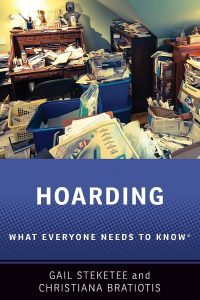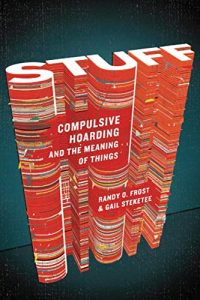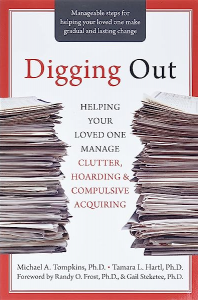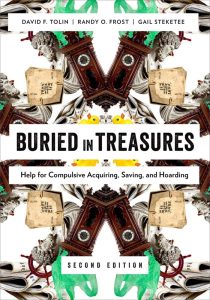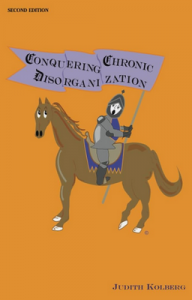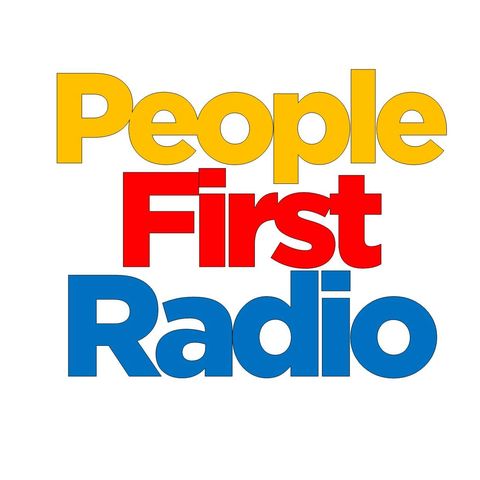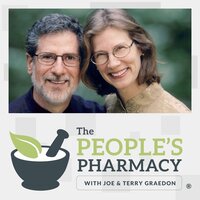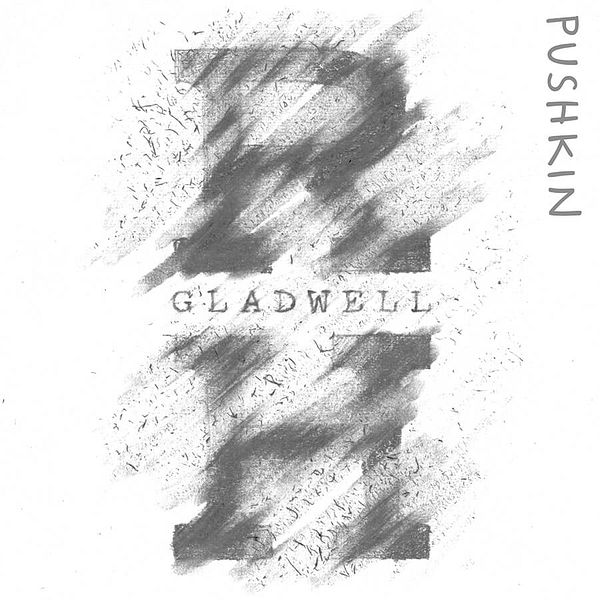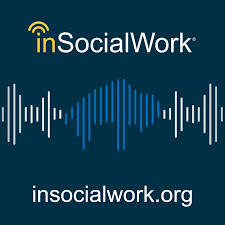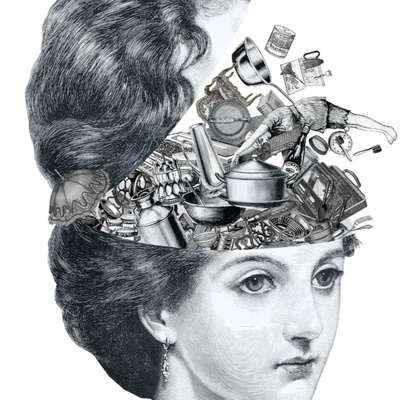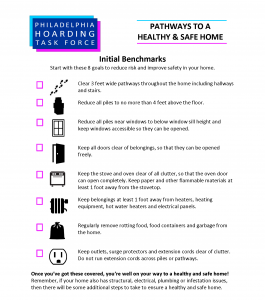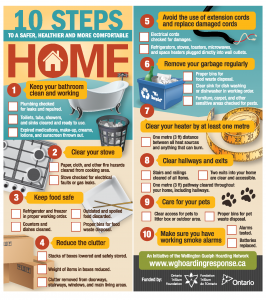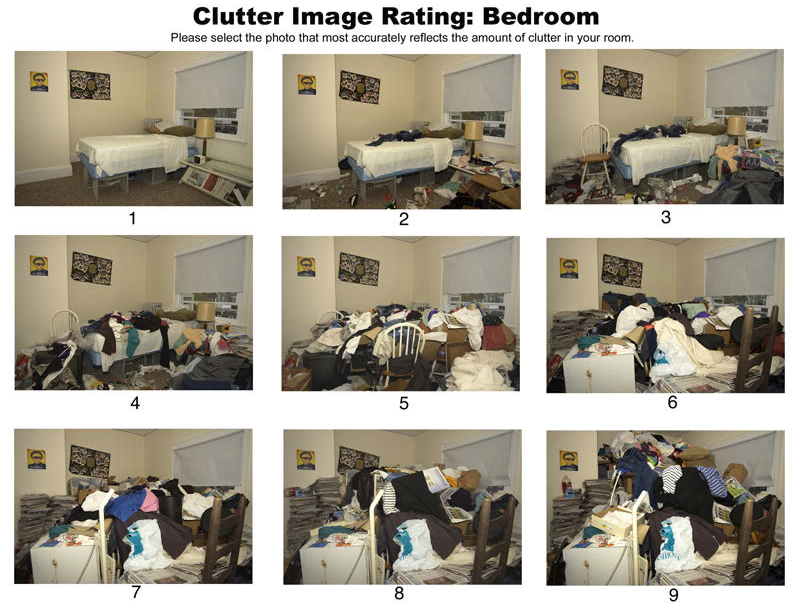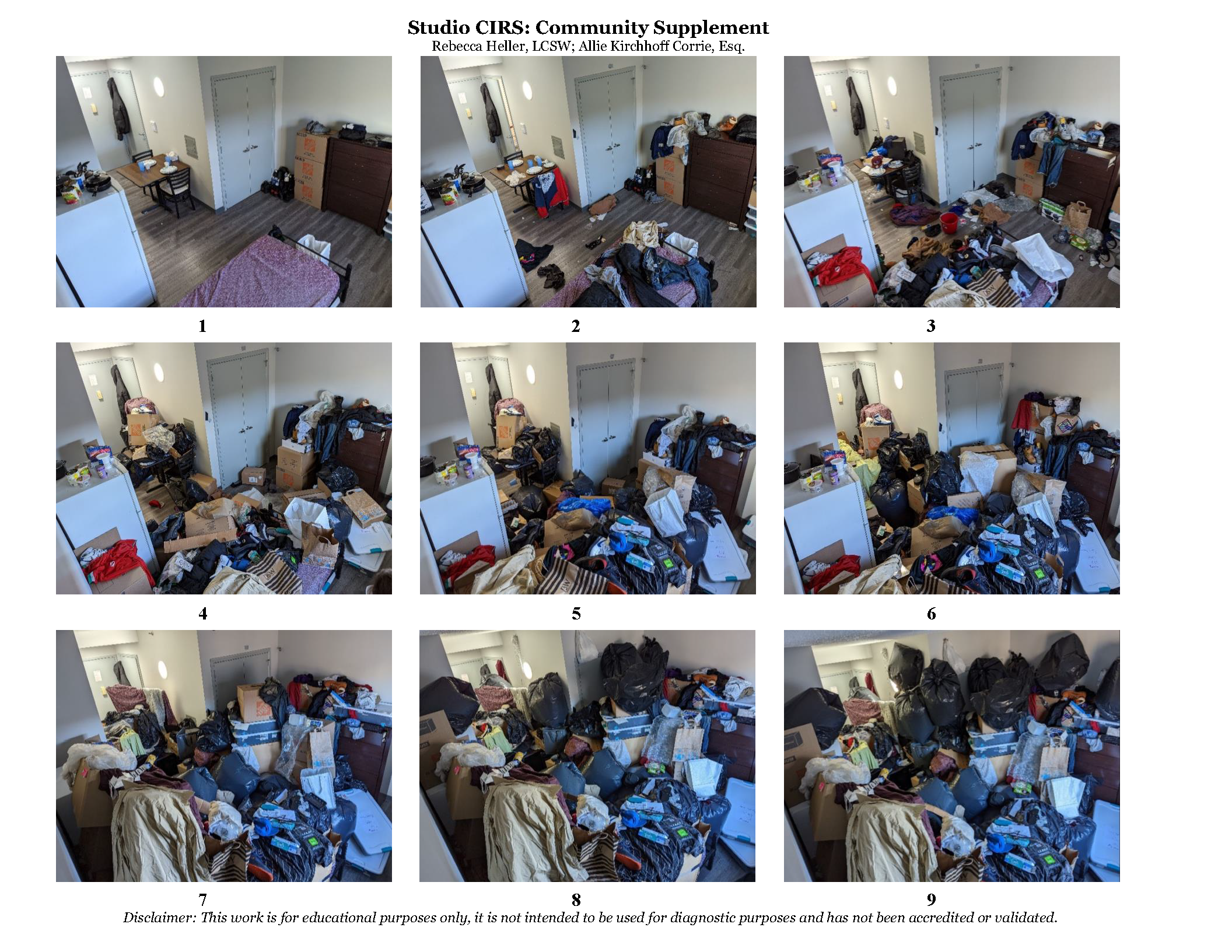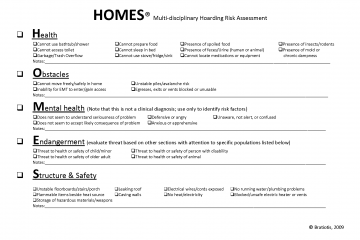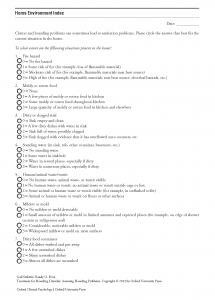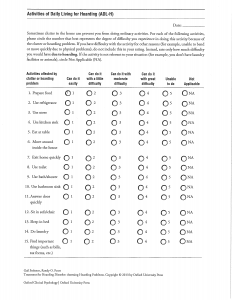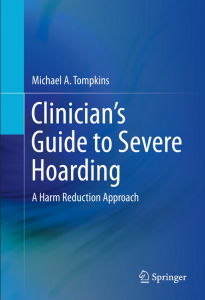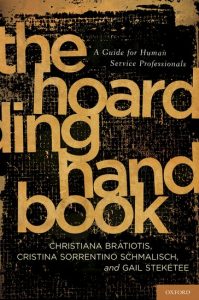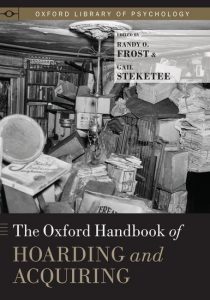General Resources
Hoarding involves attachment to personal possessions and persistent difficulty letting go of objects that other people may easily discard, donate, or recycle. After a while, possessions start to build up and important parts of the home cannot be used for everyday activities such as preparing food in the kitchen or sleeping in the bedroom. Many Canadians (about 1 in 40 of us) experience struggles with problematic clutter, difficulty discarding, or excessively acquiring.
We provide the following information in case you would like to learn more about hoarding or mental health for yourself or a loved one.
Books
Digging Out: Helping Your Loved One Manage Clutter, Hoarding, and Compulsive Acquiring (2009)
Michael Tompkins and Tamara Hartl
Buried in Treasures: Help for Compulsive Acquiring, Saving & Hoarding (2007)
David Tolin, Randy Frost,
and Gail Steketee
Videos
Dr. Christiana Bratiotis delivers a presentation on the basics of hoarding disorder. You will learn how to define hoarding, recognize the diagnostic criteria for hoarding disorder, describe the behavioural and psychological aspects of hoarding, and have the opportunity to practice assessing hoarding behaviour using tested measures.
How to Help: Strategies to Support Clients Who Hoard
Join Dr. Christiana Bratiotis in an online training geared towards helping support clients who hoard. From this talk, you will practice using strategies for intervening with and addressing hoarding in adults, identify community resources for addressing hoarding, and learn about the benefits of cross-disciplinary approaches to hoarding intervention.
Helping People Who Hoard: Alternatives to Nagging, Pleading, and Threatening
Dr. Michael Tompkins explores why some people might refuse help for hoarding problems. Specifically, he discusses common communication tactics used by family and friends that put strain on relationships, and he suggests alternative communication approaches to help fix those relationships and encourage acceptance of help.
Podcasts
Hoarding Risk-Reduction Strategies
April 23rd, 2024
Drs. Christiana Bratiotis and Sheila Woody join the NFPR Podcast to discuss the causes and trends of hoarding, in addition to new risk-reduction strategies being adopted by communities to help.
Hoarding: What it is, how to help, and myths and misconceptions
April 30th, 2022
Our very own Dr. Christiana Bratiotis joins the Vancouver Island Mental Health Society’s People First Radio to discuss hoarding, how you can help, and some common misconceptions about the behaviour that often lead to stigma.
January 13, 2022
Show #1286
In January of 2022 our own Dr. Christiana Bratiotis appeared on NPR’s The People’s Pharmacy (ep. 1286) to discuss some key things people should know about hoarding disorder. Dr. Bratiotis’s appearance begins at around 40 mins.
June 18, 2020
Episode #1, Season 5
Dragons hoard treasure, deep in their lairs. They don’t show it off to their neighbors. Revisionist History applies dragon psychology to the strange world of art museums, with help from Andy Warhol, J.R.R. Tolkien, a handful of accountants and the world’s leading hoarding expert.
November 15, 2010
Episode #59
In this episode, Dr. Gail Steketee discusses the basics of hoarding as well as her book, Stuff: Compulsive Hoarding and the Meaning of Things, to get us thinking about the “stuff” in our own lives.
In this episode of Hoarding Stuff, decluttering and organisational expert Heather Matuozzo (director of Clouds End CIC) talks with Dave Woods about clutter, resilience and decision making in life. The Hoarding Stuff podcasts aim to investigate and probe the challenges and joys experienced by a person who hoards. This episode draws on knowledge from both a professional and a service user perspective to come to a more balanced understanding.
Websites
International Obsessive-Compulsive Disorder Foundation Hoarding Centre
IOCDF is an international organization focused on helping those affected by OCD and related disorders. Resources are available for people who hoard and community service providers, as well as family and friends looking to help a loved one.
This organization is a locally-owned removal and recycling company that serves many locations in the Lower Mainland of British Columbia. Pick-ups are charged by weight, rather than by time or volume. This company also attempts to recycle picked-up items whenever possible.
Take the guesswork out of recycling – learn what kinds of materials can be recycled in your community. This app also allows you to check city pick-up schedules, set reminders, and locate your nearest recycling depot.
Articles
Community Risk Reduction:
Help for Hoarding
April 2024
Drs. Christiana Bratiotis and Sheila Woody discuss new community-centred strategies that provide help for hoarding, including the HEATH tool, which was developed by the Centre.
Psychwire ASK: Q&A with Dr. Christiana Bratiotis and Dr. Gail Steketee
February 2021
Do you have questions about mental health, but don’t know who or where to ask? Psychwire is a popular website for mental health professionals, and the ASK section allows world-leading experts to answer questions from the public. Dr. Christiana Bratiotis and Dr. Gail Steketee were invited by Psychwire to answer questions on hoarding.
Municipalities work to support those with hoarding issues
May 2019
The National Post spoke with Dr. Christiana Bratiotis about community responses to hoarding and highlighted the Toronto Hoarding Support Services Network website, which provides information about what hoarding is, self-assessment tools, as well as where and how to seek help for hoarding issues.
How to Talk to Someone with Hoarding: Do’s and Don’ts by Cristina M. Sorrentino
Cristina M. Sorrentino’s “Do’s and Don’ts” list provides a list of tips and advice for communicating with someone struggling with hoarding disorder.
Looking for more scientific journals? Check out our lab’s research publications!
Self-Help
Buried in Treasures: Help for Compulsive Acquiring, Saving & Hoarding (2007)
David Tolin, Randy Frost,
and Gail Steketee
Buried in Treasures is a self-help book for people who struggle with hoarding. Explore the reasons behind problems with acquiring, saving, and clutter. Learn to manage your relationship with your possessions with self-assessments, case examples, motivation boosters, exercises to practice new skills, and organizing tips.
10 Steps to a Safer, Healthier, and
More Comfortable Home
Wellington Guelph Hoarding Network
The “10 Steps” tool also offers concrete goals and a user-friendly conversation starter about home safety.
Clutterers Anonymous is a fellowship to support, share experiences, and provide guidance to others who experience problems with household clutter. This group uses a 12-Step framework to help reduce cluttering behaviour. Meetings are held over the phone, video chat, or in-person.
International Obsessive-Compulsive Disorder Foundation Hoarding Centre
IOCDF provides a directory of international support groups for OCD and anxiety-related disorders, including hoarding disorder. Various treatment or support groups are offered for those with lived experience, as well as family and friends of loved ones with hoarding. Many groups are now being held online and accept international participants. The IOCDF also provides an online learning module to help inform people about hoarding.
Canadian Provincial Resources for Hoarding
British Columbia
Hoarding Education and Action Team (HEAT)
The HEAT team provides hands-on help, support groups, and referrals to community services for people who struggle with clutter and hoarding in and around the Greater Victoria region.
Hoarding Action Response Team (HART)
The HART team provides individualized help – including planning, organizing, and decluttering support – to people with hoarding behaviour in the Vancouver Coastal Health region. Referrals to access other relevant community resources are also offered.
Alberta
Lethbridge Hoarding, Outreach, Management, & Education (HOME) Team
The HOME team helps to create safe spaces and reduce the risk of eviction for people living with hoarding disorder and domestic sanitation issues. Case managers work with individuals to assess, plan, and implement organizational skills.
Hoarding Disorder Foundation of Alberta
The Hoarding Disorder Foundation of Alberta (HDFA) is a non-profit organization that provides professional training, support groups, and crisis intervention services for people who struggle with hoarding.
This Full House Edmonton
This Full House Edmonton offers individualized help for people who are 55+. Program staff provide support for assessing issues, setting goals, decluttering, and reorganizing. Support groups are also offered.
Edmonton Hoarding Coalition
Edmonton Hoarding Coalition is a network of professionals who work together to generate options and solutions for people who are living with hoarding.
Carya (formerly known as Calgary Family Services)
Carya runs the Making Room support group, designed for peole who have difficulties acquiring too much stuff and difficulty letting go of things.
Saskatchewan
Saskatoon Housing Coalition
The Saskatoon Housing Coalition offers a support group to help individuals gain insight and skills to manage hoarding behaviours.
Manitoba
This Full House Winnipeg
This Full House Winnipeg offers individualized help for people who are age 55+. Program staff provide support for addressing hoarding issues, including setting goals, decluttering, and reorganizing.
OCD Centre Manitoba
Offers support groups for people with hoarding disorder, educational courses to promote recovery, community resource navigation help, and individual and family peer support.
Samaritan House Ministries Clearing the Path Program
The Clearing the Path program provides in-home assessments, decluttering/sorting/organizing help, referrals to community services, and support groups.
Prairie Mountain Inter-Agency Hoarding Coalition
The PMIHC provides assessment and public education services to respond to and prevent incidents of severe hoarding or domestic sanitation issues.
Ontario
Wellington Guelph Hoarding Response (WGHR)
The WGHR represents a committed group of organizations in Guelph and Wellington County that have come together to provide support and resources for persons with hoarding challenges. Resources are also available for those looking to support their loved ones struggling with hoarding, as well as for service providers.
Community and Home Assistance to Seniors (CHATS) Hoarding and Decluttering Support Program
The CHATS Hoarding and Decluttering Support program helps people who might be at risk of losing their housing due to hoarding, poor sanitation, clutter, or an unmaintained home. They provide services to York Region older adults using a case management approach.
VHA Clutter and Hoarding Support Program
VHA’s Clutter and Hoarding Support program offers a combination of in-home sorting/organizing sessions and hands-on decluttering support for people living in the Durham, London, and Toronto areas. Referrals to other relevant community resources are also provided.
Gatekeepers
The Hamilton Gatekeepers program works with local health and social service community partners to identify and support vulnerable older adults who are at risk of self-neglect, including neglect of conditions in the home. Service areas include the Hamilton and Halton regions.
Québec
AMI-Quebec Hoarding Support Group
AMI-Quebec offers an English-language peer support group for people struggling with hoarding.
Newfoundland & Labrador
We are not aware of hoarding community resources in Newfoundland and Labrador at this time.
Nova Scotia
Caregivers Nova Scotia
This website provides links to decluttering and organizing services in the Halifax region.
General Mental Health Resources
British Columbia Helplines
United Way BC Helpline
Offers free information and referral regarding mental health, community, government, and social services in BC. The easy-to-use search engine will help find resources based on your needs that are close to your area. Within BC, just call 2-1-1.

BC Crisis Centre
(604) 872-3311 | 1-800-SUICIDE (784-2433)
Provides confidential, non-judgmental, free emotional support either over the phone or online chat. They are available 24 hours a day, 7 days a week, for people experiencing feelings of distress or despair, including suicidal thoughts.
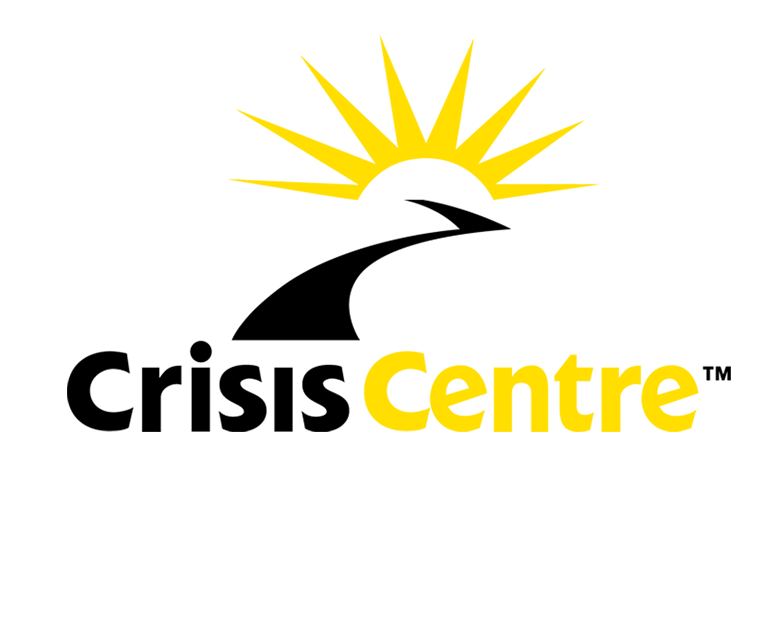
Mental Health Service Providers
UBC Psychology Clinic Resources
This link to the UBC Psychology clinic provides a comprehensive list of full cost, low cost, and online mental health care providers all over the Lower Mainland.

Vancouver Coastal Health (VCH)
VCH Vancouver Access and Assessment Centre
Offers mental health and substance use assessments and referrals. short term treatment on-site, by telephone, and by mobile response. They are available by phone or walk-in for people experiencing a non-life threatening mental health or substance use issue or for loved ones who are concerned about someone in the community.
VCH Older Adult Mental Programs
Offers services for older adults with cognitive decline due to aging-related conditions.
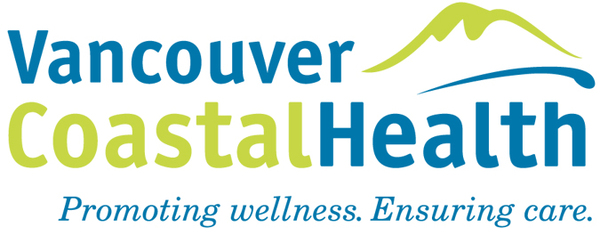
Assessment and Inspection Tools
1. Volume of Stuff
Clutter Image Rating Scale
Kitchen, Bedroom, Living Room
Gail Steketee and Randy O. Frost, 2013
Studio
Rebecca Heller and Allie Kirchhoff Corrie, 2022
The Clutter Image Rating Scale involves a series of images of cluttered spaces that can be compared to the assessment space in question. These images are used to generalize the level of clutter in spaces being assessed.
2. Identifying Risks in the Home
Home Environment Assessment Tool for Hoarding
Sheila Woody & Christiana Bratiotis, 2024
The HEATH is a one-page tool to guide assessment of the most important health and safety risks during an in-person visit in hoarded environments. It is designed for professionals in any discipline or area of community practice.
Check out more training materials on the HEATH here!
Digital use of the HEATH is best used with Adobe Acrobat Reader, free at acrobat.adobe.com.
Download the HEATH
HOMES Assessment
Christiana Bratiotis, 2009
The HOMES Assessment is an initial and brief assessment designed to assess the level of risk in a hoarded environment. It is often used to help create a plan for future risk management. It is recommended that the HOMES Assessment be completed through the use of a visual scan of the area, as well as a conversation with the resident(s) of the environment.
10 Steps to a Safer, Healthier, and
More Comfortable Home
Wellington Guelph Hoarding Network
The WGHR developed this tool as a way of opening the conversation about home safety with clients. The WGHR collaborated with local fire, public health, housing, animal and other services to create this tool, based on some of the common concerns found in homes with hoarding.
Initial Benchmarks for a Healthy and Safe Home
Philadelphia Hoarding Task Force
The Philadelphia Hoarding Task Force’s Initial Benchmarks for a Healthy and Safe Home provides 8 checklist items designed to reduce the risk in hoarded environments. These improve the overall safety of those with hoarding behaviour.
3. Ability to Use the Home
Activities of Daily Living – Hoarding
Gail Steketee and Randy O. Frost, 2013
The Activities of Daily Living-Hoarding survey consists of a list of 15 different activities. The survey is designed to be completed by the person with hoarding behaviour, who must rate the difficulty they experience in completing these activities on a scale of 1-5. This helps conceptualize how much their hoarding behaviour affects their ability to complete daily tasks.
Professional Organizations
International Obsessive-Compulsive Disorder Foundation Hoarding Centre
IOCDF is an international organization focused on helping those affected by OCD and related disorders. Resources are available for people who hoard and community service providers as well as family and friends looking to help a loved one.
IOCDF provides a directory of international support groups for OCD and anxiety-related disorders, including hoarding disorder. Various treatment or support groups are offered for those with lived experience, as well as family and friends of loved ones with hoarding. Many groups are now being held online and accept international participants. The IOCDF also provides an online learning module to help inform people about hoarding.
A Guide to Effective Interventions by Barbara Glassheim of The Saginaw Hoarding Task Force
Created in part by the Saginaw Hoarding task force, this guide is meant to inform and educate about the proper and effective hoarding intervention practices.
Hoarding Resources by MassHousing
This page by Massachusetts Housing provides a list of online resources, as well as links to training sessions and events regarding hoarding.
Helping People with Hoarding Live in Healthier Homes by Metro Housing Boston Partnership
This 2015 article discusses a new approach to hoarding intervention spearheaded by the Hoarding Intervention and Tenancy Preservation Project. This method was successful in helping 98% of hoarding clients with housing retention.
Philadelphia Hoarding Task Force
The Philadelphia Hoarding Task Force is a coalition that seeks to improve outcomes for people who hoard and reduce the catastrophic consequences related to hoarding for residents of the City of Philadelphia.
Balancing the rights of the individual with the health and safety needs of the community, the task force works to provide individuals and organizations in the region with the tools they need to successfully overcome this challenging issue.
The Philadelphia Hoarding Task Force’s Initial Benchmarks for a Healthy and Safe Home provides 8 checklist items designed to reduce the risk in hoarded environments. These improve the overall safety of those with hoarding behaviour.
Wellington Guelph Hoarding Response
Based in Ontario, Canada, the Wellington Guelph Hoarding Response is a group of organizations committed to providing support and resources for hoarding. Support and resources are available for both individuals who have hoarding, and friends and family members of loved ones affected by hoarding.
Using the harm reduction approach, the Wellington Guelph Hoarding Response provides a list of 10 steps to improve health, safety, and comfort in the home. Click this link to view their resources page, including the 10 Steps Checklist: https://wghoardingresponse.ca/resources-support/
Books
The Hoarding Handbook: A Guide for Human Service Professionals (2011)
Christiana Bratiotis, Cristina Sorrentino Schmalisch, and Gail Steketee
Looking for information about clean-outs?
The Centre for Collaborative Research on Hoarding does not endorse any of the following resources. Instead, we provide them for those looking to learn more about hoarding.
